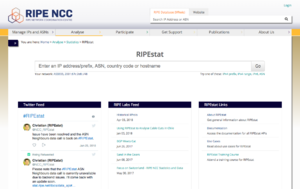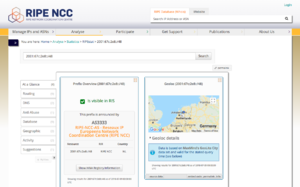RIPEstat: Difference between revisions
Added screenshots of the user interface |
Edited images |
||
| Line 29: | Line 29: | ||
This brings us to the end of the first part of our interview. In the second part we will be looking at the main data sets provided by RIPEstat along with more use cases. In the meantime, please check out the links below for more information. | This brings us to the end of the first part of our interview. In the second part we will be looking at the main data sets provided by RIPEstat along with more use cases. In the meantime, please check out the links below for more information. | ||
== References == | == References == | ||
| Line 38: | Line 36: | ||
Documentation for RIPEstat Widget API - https://stat.ripe.net/docs/widget_api | Documentation for RIPEstat Widget API - https://stat.ripe.net/docs/widget_api | ||
[[File:RIPEstat Landing Page.png|left|thumb]] | |||
[[File:RIPEstat Result Page.png|left|thumb]] | |||
Revision as of 13:57, 10 July 2018
RIPEstat is a large-scale information service and open data platform provided by the RIPE NCC. The basic idea behind RIPEstat is to provide an interface to Internet-related data. To help you get a better sense what RIPEstat is, Alena Muravska interviewed Christian Teuschel, “the human” behind RIPEstat.

Christian, tell us what is RIPEstat?
RIPEstat is the RIPE NCC’s open data platform and an information service for Internet-related data.
Interesting, can you tell me how it all started?
RIPEstat was created in 2010 to provide a user interface that enables people to access the wide range of data sources that describe Internet number resources. We saw a need to create a unified service to access all of these sources together. Over the past eight years RIPEstat has developed into a crucial information service for Internet stakeholders.
Who are these Internet stakeholders?
Initially the users of this data were network operators, who were interested how their network looks from the outside, but meanwhile we see a very broad range of users like law enforcement agencies which are looking for contact information for Internet resources or academia using the data to study the development of the Internet. The growth of the user base was also reflected in the number of daily requests that RIPEstat receives, which grew from 10,000 in 2010 to around 55 million by 2018. Especially over the past three years, the growth has been exponential.
You mentioned that RIPEstat was created to provide one user interface for many data sources. Can you tell us more about this interface?
Right from the beginning it was clear that only one interface wouldn’t cut it and we ended up with three, but this sounds more dramatic than it is!
The first is the RIPEstat Data API, which is the most basic interface. It provides unformatted raw data. The standard output format is JSON.
The second is the RIPEstat Widget API, which is kind of a user interface for the underlying RIPEstat Data API.
Last but not least is RIPEstat Web, which is what you see when you go to https://stat.ripe.net. This is a web application which makes heavy use of the RIPEstat Widget API. So the entire system is very modular, which makes it flexible and allows it to cover many use cases.
What are the use cases for RIPEstat?
RIPEstat connects with more than 25 different back-ends which cover so many use cases that it would be beyond the scope for this interview to list them all. But to give you an idea, the two most important ones are related to finding out which organisation is holding specific IP addresses and AS Numbers and whether or not these resources are being used on the Internet.
This brings us to the end of the first part of our interview. In the second part we will be looking at the main data sets provided by RIPEstat along with more use cases. In the meantime, please check out the links below for more information.
References
RIPEstat - https://stat.ripe.net
Documentation for RIPEstat Data API - https://stat.ripe.net/docs/data_api
Documentation for RIPEstat Widget API - https://stat.ripe.net/docs/widget_api


